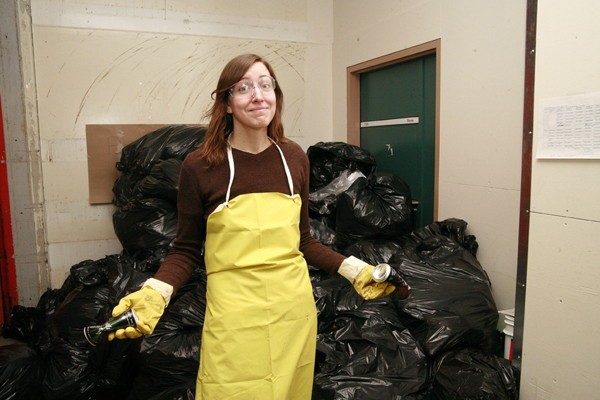Examining our waste
U of W is ahead of the composting game, but students are slow to respond
Last week, several students and paid employees spent their days sifting through banana peels, crumpled paper and used tea bags for the University of Winnipeg’s annual waste audit.
The audit examines the garbage collected at the university over the span of seven days, trying to gauge whether students know their recyclables from their compostables and if each piece of waste ends up in the appropriate bin.
The conclusions were not encouraging.
The system has been improving, but there is still work to be done, said Kate Dykman, materials conservation co-ordinator with the U of W, who co-ordinated the audit.
More recycling procedure education is the key, she said.
“The biggest challenge is letting everyone know,” she said. “Like you can’t recycle paper cups. You can compost them if they say compostable.”
The ninth annual waste audit concluded on Mar. 13. This was Dykman’s third year as co-ordinator.
The U of W is a leader in the province in terms of waste management, according to Green Manitoba program officer Lindsay Irwin.
Green Manitoba is a branch of the provincial government that funds similar waste audits in post-secondary institutions across Manitoba.
Irwin cited the U of W’s high level of commitment as earning them this distinction, as well as the innovative post-consumer organics program at the university.
Post-consumer waste is what is left after the food has been eaten by customers.
In 2007 the U of W started placing composting bins on campus for this purpose.
Some universities have programs that deal with kitchen and food services waste, but only the U of W deals with it after it reaches a plate, according to Irwin.
“I’m really happy we’re dealing with organics,” Dykman said. “It’s the second largest waste stream we have.”
Paper is the first, she said.
The organic material is composted at the Rockwood Institution, a minimum-security prison adjacent to Stony Mountain Penitentiary.
Rockwood pays prisoners minimum wage to work in composting, said Slavick Duda, assistant operations manager at Rockwood.
Duda said using prison labour for this cause is beneficial for everyone involved.
“We train them in work ethics, like coming to work on time and building relationships with other people,” he said.
Former prisoners can later use those skills to get jobs outside of prison.
The U of W pays a “tipping fee” to transport the material to the Rockwood site, much like the fees at the Brady landfill, said Duda.
Scott Harrison is a U of W alumnus who has been sorting trash for the audit for four years.
“I enjoy doing it,” he said. “It’s an environmental thing, and it’s fun.”
Harrison is aware that students do not take as much time to properly dispose of their waste.
“We’re all apathetic students,” he said. “Too many compostable materials go in the garbage.”
Students are encouraged to be active in their waste management by working the audit.
“There’s a real educational value to seeing how much waste comes through,” Irwin said.
Published in Volume 63, Number 24 of The Uniter (March 19, 2009)







